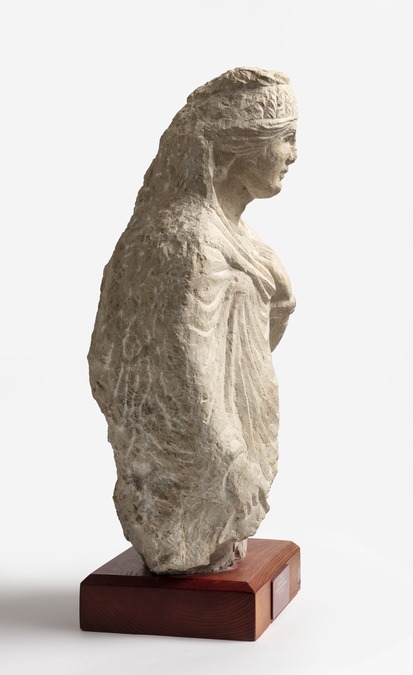Woman from a Palmyrene sarcophagus
Summary
The woman depicted was probably a part of a large sarcophagus, now detached by the waist. The surface of the portrait is slightly weathered and fragments are missing from her coiffure and the bracelet on her left arm. She is portrayed frontally, with her head turning slightly towards her left side. She is wearing a tunic and her veil or himation is wrapped around her body and attached to the back of her head. She is adorned with jewellery.
Description of object
The object depicts a standing female figure, and it potentially belonged to a sarcophagus lid due to its size. The woman depicted, who remains unidentified, only survives up towards the waist. The surface of the portrait is slightly weathered and fragments are missing from her coiffure and the bracelet on her left arm. She is portrayed frontally, with her head turning slightly towards her left side. Her right arm is held to the side; her left arm is bent, and raised up to her chest. Her hair, directly over her forehead, is centrally parted and covers most of her ears. The individual strands of hair are rendered by slightly oblique grooves. The rest of her hair is gathered upwards in a series of plaints indicated by vertical grooves with diagonal, incised lines on either side. The coiffure raises upwards in twisted locks and on the top of her head, a thick, twisted lock is positioned, almost resembling a small crown – the so-called “Faustinia hair-style.” The woman’s forehead is slightly protruding and her eyebrows are indicated by ridges and a dark pigment. The woman is depicted wearing a veil attached to the back of the head that falls over both shoulders and covers most of the body. The right edge of the veil proceeds across the chest in a curving fold and falls over the left shoulder. Her face is soft, almost fleshy, the nose wide, and the mouth narrow. The eyebrows are rendered by thin, curving ridges, starting from the root of the nose. The eyes are small, almond-shaped, and styled with thick upper eyelids. Although facing frontally, her gaze is averted off-center, as though she is looking into the distance. The chin is wide and a horizontal groove on her neck implicates a line. She is wearing a short-sleeved tunic with a rounded neckline. The right arm is under-proportioned and is held down her side, slightly flexed, completely covered by the veil. Her right hand is clenched around the garment, with the index finger extended, pointing downwards. The left arm is flexed in front of the torso, with the left hand grasping the veil. The middle and ring fingers are flexed, the rest are extended. Fingernails are indicated. The woman is wearing earrings, the so-called dumbbell-shaped earrings, with a bead attached to a chain. A plain necklace, with a large circular pendant, is situated close to her neck. Furthermore, she is wearing a large bracelet around her left wrist. The bracelet has a central, oval inlay.
H: 58 cm.; W: 29 cm.; D: 24 cm. Head, H: 16 cm.; W: 12.5 cm.
Choice of methods
Visual examination
- Macroscopic
Bibliography
Ingholt Archive
H. Ingholt (1928), Studier over Palmyrensk Skulptur, København, 142, PS 450.
H. Ingholt (1935), Five Dated Tombs from Palmyra, Berytus II, 69-70, pl. XXXI,2.
K. Parlasca (1987), Ein antoninischer Frauenkopf aus Palmyra, in Frel, J. et. al. (eds.) Ancient portraits in the J. Paul Getty Museum, Volume 1, Malibu, 108-110, abb. 2.
F.O. Hvidberg-Hansen & G. Ploug (1993), Palmyra Samlingen, Ny Carlsberg Glyptotek, København, 133, no. 87.
G. Ploug (1995), Catalogue of Palmyrene Sculptures, Ny Carlsberg Glyptotek, Copenhagen, 212-214, no. 87.
S. Krag (2016), Females in group portraits in Palmyra, in Kropp, A and Raja, R. (eds.), The World of Palmyra, Palmyrene Studies 1, Copenhagen, 190, fig. 6.
S. Krag (2018), Funerary Representations of Palmyrene Women. From the First Century BC to the Third Century AD, Studies in Classical Archaeology 3, Turnhout, 73, 381, cat. no. 805.
- IN 1150
- Portrait
- c. 210-230 C.E.
- Roman Imperial
- Limestone
- Acquired by Puttmann in Syria. Original grave context unknown.
- H: 58 cm.; W: 29 cm.; D: 24 cm. Head, H: 16 cm.; W: 12.5 cm.





